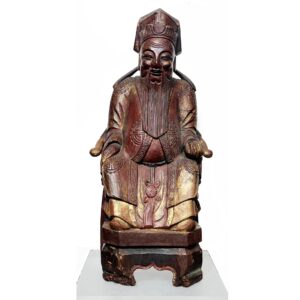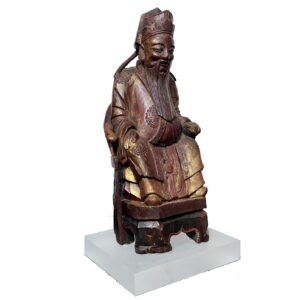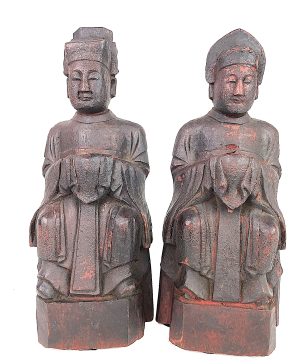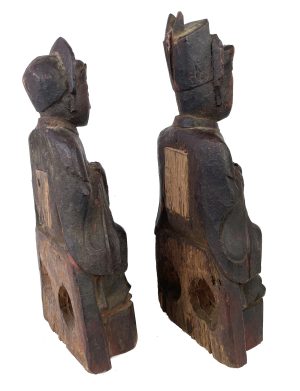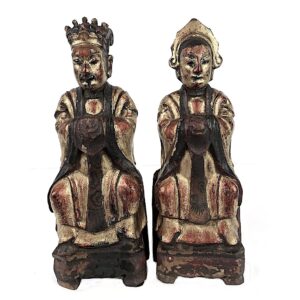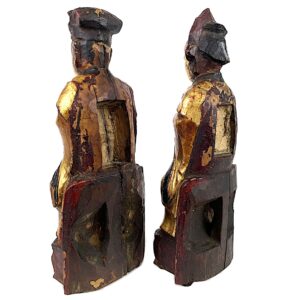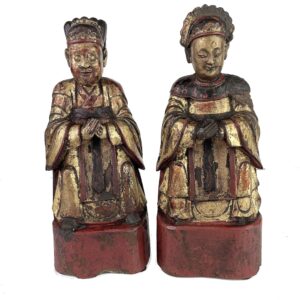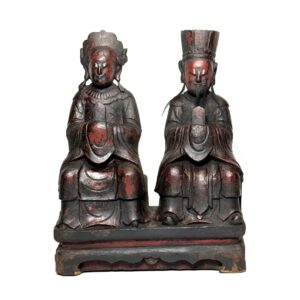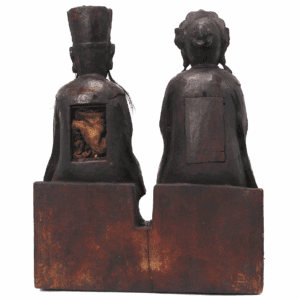-
Sale!


$745.00 Original price was: $745.00.$595.00Current price is: $595.00.
H: 10.25” W: 4.75” D: 3.625” | FREE SHIPPING WITHin Continental U.S.
Taoist God of Wealth (Caishen) portrayed as benevolent authoritative figure associated with wealth: holds tael, robe with coin decorations, painted with red and gold.
-
Sale!


$695.00 Original price was: $695.00.$525.00Current price is: $525.00.
H: 7.25 ” W: 3 ” D: 1.625 ” | FREE SHIPPING WITHIN CONTINENTAL U.S.
Finely carved Kitchen God and his wife, mirror images on backless chairs with multi-sided pedestals reflecting reverent and responsibility to protect the home. Naturally darkened lacquer, soft patina. Male with consecration covering, female open with contents. Unique house warming/wedding gift.
-
Sale!


$695.00 Original price was: $695.00.$525.00Current price is: $525.00.
H: 7.75 ” W: 2.875 ” D: 1.875 ” | FREE SHIPPING WITHIN CONTINENTAL U.S.
Husband and wife Kitchen Gods are near mirror images with similar layered gold officials’ robes, clasped hands covered in ritual cloth. Excellent condition, fine patinas. Consecration script remaining in wife’s cavity but not in husband’s.
-
Sale!


$785.00 Original price was: $785.00.$650.00Current price is: $650.00.
H: 7.75″ W: 3.25″ D: 2.375″ | free shipping within Continental U.S.
Finely carved this Kitchen God and his Wife monitor family members from their perch above the stove. Near mirror images with layered gold officials’ robes they symbolically hold tablets to report about the family to the Jade Emperor on Chinese New Year. enhance feng shui. Kitchen Gods especially pairs are now rare and very collectible and make unique wedding and house gifts.
-
Sale!


$895.00 Original price was: $895.00.$695.00Current price is: $695.00.
H: 10″ W: 7.75″ D: 8.25″ | FREE SHIPPING WITHIN CONTINENTAL U.S.
Rare single image of Kitchen God and wife, indicating their close/lasting relationship as family’s protectors. Detailed elaborate officials’ robes, headgear. Individually portrayed holding hu tablets like those held by high court officials or Taoist priests.
-
Sale!


$625.00 Original price was: $625.00.$425.00Current price is: $425.00.
H: 8.25″ W: 3.125″ D: 2.25″ | FREE SHIPPING!
This Kitchen God and his Wife is posed as streamlined virtual mirror-images and fashioned with a general quality relying on paint rather than deep carving for details. They sit on backless chairs on a plinth, with simplified gold officials’ robes with long color sashes, and well-carved black and gilt head gear. The wife’s face is smooth, generalized and the male face has a more deeply carved surface and painted highlights.
End of content
End of content

